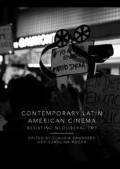Abstract
Thornton argues that neoliberalism can determine both the reading of a film and the roles key workers play in the production and the consumption of film. She examines the careers and contributions of the director, principle actor, source text author and the music supervisor to the making of the Mexican film, Paraíso ¿Cuánto pesa el amor? (Mariana Chenillo, 2013). The fat body of the protagonist and her attempts to control and, eventually, accept it is a central motivating force in the narrative. Therefore, Thornton considers the ways the film critiques how women’s bodies are subjected to scrutiny and regulation under neoliberalism. The film provides both a fascinating case study at textual level because of its narrative concerns and at a contextual level as an opportunity to explore women’s creative contributions. Consequently, Thornton analyzes how neoliberalism is an inescapable determinant in understanding Paraíso ¿Cuánto pesa el amor? as a nodal point for the intersection of multiple interests.
Access this chapter
Tax calculation will be finalised at checkout
Purchases are for personal use only
Works Cited
Arévalo, Julieta. 2013. Paraíso y otro cuentos incómodos. México: Casa Editorial Abismos.
Balfour, Brad. 2010. “Exclusive Q&A: The Jewish-Mexican Experience Via Mariana Chenillo’s Award-Winning Film.” HuffPost, October 15, 2010. http://www.huffingtonpost.com/brad-balfour/exclusive-qa-the-jewish-m_b_764653.html. Accessed October 2, 2017.
Bauman, Zygmunt. 2001. The Individualized Society. Cambridge: Polity Press.
Burns-Ardolino, Wendy A. 2009. “Jiggle in My Walk: The Iconic Power of the ‘Big Butt’ in American Pop Culture.” In The Fat Studies Reader, edited by Esther Rothblum and Sondra Solovay, 271–87. New York and London: New York University Press.
Cinco días sin Nora. 2009. DVD. Mexico: Mariana Chenillo.
Couldry, Nick. 2010. Why Voice Matters: Culture and Politics After Neoliberalism. Los Angeles and London: Sage.
Hecho en México. 2012. DVD. Mexico: Duncan Bridgeman.
La Berge, Leigh Claire, and Quinn Slobodian. 2017. “Reading for Neoliberalism, Reading Like Neoliberals.” American Literary History 29 (3): 602–14.
Martin, Deborah, and Deborah Shaw. 2017. “Introduction.” In Latin American Women Filmmakers: Production, Politics, Poetics, edited by Deborah Martin and Deborah Shaw, 1–28. London: I.B. Tauris.
Marwick, Alice, and Dana Boyd. 2011. “To See and Be Seen.” Convergence: The International Journal of Research into New Media Technologies 17 (2): 139–58.
Mendible, Myra, ed. 2007. From Bananas to Buttocks: The Latina Body in Popular Film and Culture. Austin: University of Texas Press.
Molina Guzmán, Isabel, and Angharad N. Valdivia. 2004. “Brain, Brow, and Booty: Latina Iconicity in U.S. Popular Culture.” The Communication Review (April): 205–21.
Obvious Child. 2014. Streaming. USA: Gillian Robespierre.
Page, Joanna. 2009. Crisis and Capitalism in Contemporary Argentina Cinema. Durham and London: Duke University Press.
Paraíso ¿Cuánto pesa el amor? 2013. DVD. Mexico: Mariana Chenillo.
Raisborough, Jayne. 2016. Fat Bodies, Health and the Media. London: Palgrave Macmillan.
Rêgo, Cacilda, and Carolina Rocha. 2011. New Trends in Argentine and Brazilian Cinema. Bristol: Intellect.
Rincón, Daniela. 2012–Present. “Home.” YouTube Channel. https://www.youtube.com/user/ladanielarincon/videos. Accessed October 23, 2017.
Rothblum, Esther, and Sondra Solovay, eds. 2009. The Fat Studies Reader. New York and London: New York University Press.
Sánchez Prado, Ignacio. 2014a. Screening Neoliberalism. Mexican Cinema 1988–2012. Nashville: Vanderbilt University Press. Kindle.
———. 2014b. “Regimes of Affect: Love and Class in Mexican Neoliberal Cinema.” Journal of Popular Romance Studies 4 (1): 1–19.
Sanders, Rachel. 2017. “Self-tracking in the Digital Era: Biopower, Patriarchy, and the New Biometric Body Projects.” Body and Society 23 (1): 36–63.
Shaw, Deborah. 2013. The Three Amigos: The Transnational Filmmaking of Guillermo del Toro, Alejandro González Iñárritu and Alfonso Cuarón. Manchester and New York: Manchester University Press.
Stam, Robert. 2007. “Introduction: The Theory and Practice of Adaptation.” In Literature and Film: A Guide to the Theory and Practice of Film Adaptation, edited by Robert Stam and Alessandra Raengo, 1–52. Malden and Oxford: Blackwell.
Supporting Characters. 2012. Streaming. USA: Daniel Schechter.
The Incredible Jessica James. 2017. Streaming. USA: James C. Strouse.
Thornton, Niamh. 2017. Unpublished Interview with Lynn Fainchtein, October 10, 2017.
Van Krieken, Robert. 2012. Celebrity Society. Oxon: Routledge.
Vargas, Andrew S. 2015. “Mariana Chenillo on How Female Directors are Expected to Look Pretty.” Remezcla, February 13, 2015. http://remezcla.com/features/film/mariana-chenillo-female-directors-expected-look-pretty/. Accessed October 2, 2017.
Venuti, Lawrence. 2007. “Adaptation, Translation, Critique.” Journal of Visual Culture 6 (1): 25–43.
William Foster, David. 2002. Mexico City in Contemporary Mexican Cinema. Austin: University of Texas Press.
Author information
Authors and Affiliations
Editor information
Editors and Affiliations
Rights and permissions
Copyright information
© 2018 The Author(s)
About this chapter
Cite this chapter
Thornton, N. (2018). Paraíso ¿Cuánto pesa el amor?: Challenging the Neoliberal in Mexican Cinema. In: Sandberg, C., Rocha, C. (eds) Contemporary Latin American Cinema. Palgrave Macmillan, Cham. https://doi.org/10.1007/978-3-319-77010-9_5
Download citation
DOI: https://doi.org/10.1007/978-3-319-77010-9_5
Published:
Publisher Name: Palgrave Macmillan, Cham
Print ISBN: 978-3-319-77009-3
Online ISBN: 978-3-319-77010-9
eBook Packages: Literature, Cultural and Media StudiesLiterature, Cultural and Media Studies (R0)

